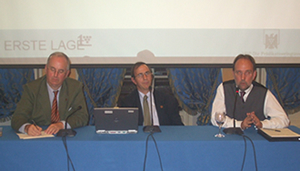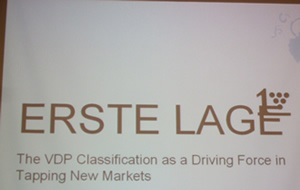 |
| Speaker Pinz Salm-Salm (L) and moderator Joel Payne (R)
|
The Verband Deutscher Prädikatsweingüter (Association of German Prädikat Wine Estates) or VDP was founded in 1910 and is the world’s oldest private association of top quality wine estates. It currently has a membership of around 200 estates and frames its own laws within the government regulations, informed Prinz Salm-Salm, who was at the group's helm from 1990 till 2007, when he decided not to seek re-election for the top job.
An eagle with a bunch of grapes in its talon, the logo of VDP, is a symbol of quality and its classification has become a driving force in tapping new markets. As the German wine laws that were modified in 1971 are generally thought to be not only very confusing, but have resulted in a decline of quality of German wines, this is a positive development. From a classification based on nature and selected sites, the government changed that to sugar content, or alcohol potential, and allowed every producer to write a vineyard name on the label, even if that plot of land were better planted with potatoes. The industry has since seen a nadir of the famous Rieslings that commanded prices as high as the top chateau wines of Bordeaux in and around 1900, he said.
The 1971 law brought down tradition and history. Almost all German wine has almost always been always dry, said the Prinz. Today, they are considered cheap and sweet because of chaptalisation, technical prowess and legislation that confuses the consumer. In the past, most wines were sold without mention of a given vineyard site. Just mentioning a village indicated it would be a better wine.
The VDP has been able to help improve quality by requiring members’ voluntary adherence to strict quality criteria set by the Association, and which exceed by far the minimums prescribed by law. For instance, all grapes for the finer wines are selectively harvested by hand in vineyards planted only with traditional grape varieties. Thus, the grape varieties, yield, style, packaging and marketing are under the review of the association, which is owned and run by its growers only.
Estates and their wines are inspected and certified on a regular basis to ensure ongoing high standards, from vineyard maintenance to cellar technology. Every 5 years each membership is reviewed. Thus, over the past generation, 68 members have been expelled, while 98 have been added, related Prinz Salm.
When I confronted Prinz Salm later that day about an estate owner on the Mosel, whom I had visited a couple of months ago, and who told me he had left VDP of his own accord. Prinz Salm said it was not likely. ‘Years ago, about 20 producers left on their own due to a question of chaptalization. Since then many have been waiting to be taken in, but no one wants to leave,’ he clarified.
New VDP Classification of 2001
 One of the greatest challenges Prinz Salm-Salm and VDP successfully handled was the preservation of Germany’s finest vineyard sites. Using Burgundy as a model, the VDP began to establish a private classification of its members’ vineyard sites with a three-stage pyramid like Burgundy based on the origin, with Erste Lage being the top estates equivalent of Grand Cru. One of the greatest challenges Prinz Salm-Salm and VDP successfully handled was the preservation of Germany’s finest vineyard sites. Using Burgundy as a model, the VDP began to establish a private classification of its members’ vineyard sites with a three-stage pyramid like Burgundy based on the origin, with Erste Lage being the top estates equivalent of Grand Cru.
The dry wines with less than 9 grams of residual sugar are labeled Gross Gewächse (GG), or Erstes Gewächs in Rheingau, whereas the fruity wines with natural sweetness bear the traditional prädikats, from Spätlese to TBA.
Below that they have Terroirweine from either classified sites of superior, but not outstanding, quality. The third one is Orts (village) or Gutsweine, which is basic quality wine that reflect regional character.
Today, if the eagle logo and a numeral “one” next to a stylized cluster of grapes (embossed on the bottle or in the background of the labels behind the name of the vineyard site) has helped the world markets recognize the wine quality of these estates, it is thanks to self-regulation. ‘French and Italian laws have not been able to solve the quality problem’, was the general opinion of the audience. The French system for instance, is not a guarantee of quality. Is it still a useful tool? Or should it be reduced or abolished so as to be better understood in new markets, was the question still left unanswered.
But the general mood was summarized by Joel Payne, a German wine specialist, who felt that ‘today Erste Lage is a private initiative and the quality control is strict. However, if the government takes the initiative , things can go wrong, as the state is not keen to keep quality high, but to please its voters.’
Lesson for India
There may be a latent lesson from VDP in India, where - although there is a clamour for total governmental control on the quality specifications - the law of the jungle now prevails. Whereas the government has not been pro-active enough in framing the law, perhaps due to lack of the domain knowledge, it could easily fall into the trap of French classification system.
The newly formed Indian Grape Processing Board should take upon itself the onerous task of setting the standards. Government and the industry being together in this initiative, at least in the initial stages, it may be able to take a pragmatic approach, but speed would be of essence, if we have the interest of the consumer in mind.
VDP in India
Incidentally, Joel Payne, who is the President of FIJEV, the international association of wine writers, will be in India next month to present wines from the top VDP wine estates. He is better known in Germany as the publisher and editor of Gault Millau, the coveted annual German Wine Guide, whose 2010 edition will be released on Tuesday, the 17th November in Mainz. His tasting in India will take place by invitation at the residence of the German Ambassador in Delhi on Monday, December 7. The select group of invitees will have a date with 24 beauties from Germany. |